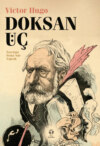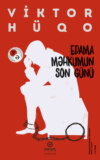Kitabı oku: «Ninety-Three», sayfa 10
"Idle talk," muttered Robespierre; "Lasource is not my friend."
He added thoughtfully, —
"In the mean time there are eighteen manufactories of false assignats in London."
Marat went on in a voice calm but somewhat tremulous, an ominous sign with him, —
"You are the faction of the All-Importants. Yes, I know everything, in spite of what Saint-Just calls the silence of State – "
Marat emphasized this word, looked at Robespierre, and continued: —
"I know the conversation that takes place at your table on the days when Lebas invites David to eat the food prepared by his betrothed, Élisabeth Duplay, your future sister-in-law, Robespierre. I am the all-seeing eye of the people, and from the depths of my cave I observe. Yes, I hear, I see, and I know. You are contented with small things. You admire yourself. Robespierre shows himself off before his Madame de Chalabre, the daughter of the Marquis who played whist with Louis XV. on the evening of Damiens' execution. Yes, heads are carried high in these days. Saint-Just never unbends; Legendre is a scrupulous devotee to fashion, with his new frock-coat and white waistcoat, and a frill, that people may forget his apron. Robespierre imagines that history will be interested to know that he wore an olive-colored coat à la Constitution, and a sky-blue coat à la Convention. He hangs his portrait on every wall around his room – "
Robespierre interrupted him in a voice even more quiet than that of Marat himself: —
"And you drag yours through all the sewers, Marat."
They continued this conversation in tones whose very deliberation emphasized the violence of the attacks and retorts, and added a certain irony to the implied threats.
"Robespierre, you called those who are in favor of the abolition of monarchy the Don Quixotes of mankind."
"And you, Marat, after the 4th of August, in No. 559 of your 'Ami du Peuple,' – you see, I remember the number, a useful item, – you requested to have the titles of the nobles restored to them. You said: 'Once a Duke, always a Duke.'"
"Robespierre, in the session of the 7th of December you defended Roland's wife against Viard."
"Just as my brother defended you, Marat, when you were attacked at the Jacobins'. What does that prove? Nothing at all."
"Robespierre! we all know the cabinet at the Tuileries where you said to Garas: 'I am tired of the Revolution.'"
"Marat, in this very ale-house, on the 20th of October, you embraced Barbaroux."
"And you said to Buzot, Robespierre, 'What does the Republic signify?'"
"Marat, you invited three men from Marseilles to breakfast with you here in this ale-house."
"Robespierre, you go about escorted by a strong fellow from the market armed with a club."
"And you, Marat, on the eve of the 10th of August, – you asked Buzot to assist you in escaping to Marseilles disguised as a jockey."
"During the prosecutions of September you took good care to hide yourself, Robespierre."
"And you, Marat, were not backward in making a display of yourself."
"Robespierre, you flung the red cap on the ground."
"Yes, when a traitor hoisted it. Dumouriez defiles Robespierre."
"Robespierre, you refused to throw a veil over the head of Louis XVI. when Chateauvieux' soldiers were passing."
"I did better than veil his head; I cut it off."
Danton interposed, but it was like pouring oil upon the flames.
"Robespierre, Marat, calm yourselves," he said. Marat did not like to be mentioned in the second place. He turned round.
"What affair is this of Danton?"
"What affair of mine? I will tell you. There must be no fratricides; we must have no strife between two men, both of whom serve the people. It is enough to have to deal with foreign and civil wars, and it would be too much if we were to have a family conflict. It is I who made the Revolution, and I do not choose to have it destroyed. This is why I feel called upon to interfere."
Marat replied, without raising his voice, —
"You had better be attending to the settlement of your own accounts."
"My accounts!" cried Danton. "Go ask for them in the passes of Argonne, in Champagne delivered, in Belgium conquered, in the armies where I have exposed my breast four times already to the grape-shot! Inquire in the Place de la Révolution, on the scaffold of the 21st of January, of the throne lying on the ground, of the guillotine, that widow – "
Here Marat broke forth, interrupting Danton, —
"The guillotine is a virgin who gives death unto men, but not life."
"What do you know about it? I will make her fruitful."
"We shall see."
And he smiled.
Danton saw the smile.
"Marat," he cried, "you are the man who prefers to hide; I am a man who rejoices in broad daylight, in the open air. I despise the life of a reptile. It would not suit me to be a woodlouse. You live in a cave; I live in the street. You hold no communication with mankind; the chance passer-by may see and speak with me."
"Handsome youth! Will you ascend to my abode?" growled Marat.
And no longer smiling, he continued in a peremptory tone: —
"Danton, give an account of the thirty-three thousand crowns cash, that were paid you by that Montmorin in the name of the king, under the pretext of indemnifying you for the post of solicitor of the Châtelet."
"I belonged to the 14th of July," said Danton, haughtily.
"And the Garde-meuble? And the crown diamonds?"
"I was also of the 6th of October."
"And the thefts of your alter ego, Lacroix, in Belgium?"
"I was of the 20th of June."
"And the loans to Montansier?"
"I influenced the people to bring about the return from Varennes."
"And the Opera House built with the money that you furnished?"
"I armed the sections of Paris."
"And the hundred thousand livres in secret funds of the Ministère de la Justice?"
"The 10th of August was my work."
"And the two millions secret expenses of the Assembly, a quarter of which fell to your share?"
"I arrested the progress of the enemy, and barred the road to the allied kings."
"Prostitute!" cried Marat.
Danton was terrible in his wrath.
"Yes," he cried; "you have spoken the word! I have sold my virtue, but I saved the world!"
Robespierre meanwhile continued to bite his nails. He could neither laugh nor smile. He possessed not the lightning-like laughter of Danton, nor the sting of Marat's smile.
Danton continued, —
"I am like the ocean: I have my flood and ebb. When the tide is low you can see the shoals; but at high tide you see only the waves."
"What one might call your froth," said Marat.
"My tempest, rather," replied Danton.
They both sprang to their feet, and Marat burst forth; the adder suddenly assumed the shape of a dragon.
"Ah, Robespierre! ah, Danton!" he exclaimed, "you will not listen to me. I tell you, you are lost! Your policy brings you up against a wall! Every issue is closed to you, and you go on committing deeds that will finally leave you with no outlet save that of the grave."
"In that lies the very essence of our greatness," said Danton, shrugging his shoulders.
Marat went on: —
"Danton, beware! Vergniaud has a wide mouth, thick lips, and frowning brows, like yourself. He is also pitted, like you and Mirabeau. Yet this did not prevent the 31st of May. Ah, you shrug your shoulders! A shrug of the shoulders has been known to cost a man his head. I tell you, Danton, your loud voice, your loose cravat, your top-boots, your late suppers, your ample pockets, – Louisette will have something to say about all that."
Louisette was Marat's pet name for the guillotine.
He continued: —
"And as for you, Robespierre, you are a Moderate; but that will avail you nothing. Go on; powder and dress your hair, brush your clothes, play the coxcomb, wear fine linen, be a model of propriety, frizzed and bedizened; sooner or later you will go to the Place de Grève; read Brunswick's proclamation, and make up your mind to be treated like the regicide Damiens, and you are arrayed in fine style to be drawn and quartered."
"Echo of Coblentz!" muttered Robespierre between his teeth.
"Robespierre, I echo no one. I am the cry of the whole world. Ah, you are young, both of you! How old are you, Danton? Thirty-four. And you, Robespierre? Thirty-three. Well, as for myself, I have lived from the beginning of time. I am the embodiment of the ancient misery of mankind. I am six thousand years old."
"That is true," replied Danton; "for six thousand years Cain has been preserved in hatred, like a toad in a stone. The stone breaks, and Cain leaps forth among men, to be known as Marat."
"Danton!" cried Marat; and a livid glare shone in his eyes.
"Well, what is it?" said Danton.
Thus conversed these three terrible men, – conflicting thunderbolts!
III
A QUIVERING OF THE INMOST FIBRES
The conversation ceased for a time. Each Titan betook himself to his own reflections.
Lions are disturbed by hydras. Robespierre had grown very pale, and Danton very much flushed. Both shuddered. Marat's wild glare had died out; calmness, imperious calmness, now rested on the face of that man, feared by those who were themselves objects of awe.
Danton felt himself conquered, but was unwilling to yield.
He continued, —
"Marat talks loudly of dictatorship and unity, possessing all the while a talent for destroying."
Robespierre opened his thin lips, and by way of supplementing Danton's speech remarked, —
"I agree with Anacharsis Cloots. Give me neither Roland nor Marat."
"And I," said Marat, – "I say neither Danton nor Robespierre."
He gazed steadily at the two men, and then added:
"Let me advise you, Danton. You are in love, and think of marrying again; let politics alone, – be wise."
And taking a step towards the door, he was about to take his departure, with the ominous salutation, —
"Farewell, gentlemen."
Danton and Robespierre shuddered.
At that moment a voice was heard at the farther end of the room, saying, —
"You are wrong, Marat."
All turned. During Marat's outbreak some one had entered, unperceived, through the door at the back of the room.
"Is that you, citizen Cimourdain?" said Marat "Good-day."
It was Cimourdain.
"I tell you that you are wrong, Marat," he repeated.
Marat turned green, which was his way of growing pale, and Cimourdain added: —
"You are useful, but Robespierre and Danton are indispensable. Why do you threaten them? Let us have union, citizens. The people wish us to be united."
This entrance was like a dash of cold water, or the arrival of a stranger upon the scene of a family quarrel; it produced a calming effect upon the surface, if it did not reach the depths.
Cimourdain advanced towards the table.
Both Danton and Robespierre knew him. They had often noticed, in the public tribunals of the Convention, this obscure but influential man, whom the people greeted with respect. Robespierre, however, always ceremonious, inquired, —
"How did you get in, citizen?"
"He belongs to the Évêché," replied Marat, in an unusually meek tone of voice.
Marat braved the Convention and led the Commune, but he feared the Évêché.
This is a law.
Mirabeau, in some mysterious far-away depth, is conscious of the existence of Robespierre. Marat, too, is aware of Hébert, – Hébert of Babeuf. So long as the subterranean strata remain quiet, the politician can move at his ease. But there is a sub-soil under the most revolutionary, and the boldest men will quail when they feel beneath their feet the movement which they themselves have started overhead.
To be able to distinguish between the disturbance that springs from covetousness and that which is founded on principle, to combat the one and to aid the other, constitutes the genius and merit of great revolutionists.
"Oh, citizen Cimourdain is not unwelcome," he said, as he extended his hand to Cimourdain, adding:
"Parbleu! Let us explain the situation to citizen Cimourdain. He comes in just in time. I represent the Mountain, Robespierre the Committee of Public Safety, Marat the Commune; and Cimourdain represents the Évêché. He will give us the casting vote."
"So be it," replied Cimourdain, in his serious and simple manner. "What is the subject under consideration?"
"The Vendée," replied Robespierre.
"The Vendée," echoed Cimourdain, then went on:
"There lies the great danger. If Revolution expires, the Vendée will have given it its death-blow. One Vendée is more to be feared than ten Germanys. If France is to be saved, we must destroy the Vendée."
These words won Robespierre to his side; but still the latter put the question, —
"Were you not formerly a priest?"
For the priestly aspect had not escaped his observation. He recognized in another what he had within himself.
"Yes, citizen," replied Cimourdain.
"What does that matter?" cried Danton. "When priests are good they are better than other men. In time of revolution priests are melted into citizens, just as bells are melted into sous and cannon. Danjou and Danon are both priests. Thomas Lindet is Bishop of Évreux. At the Convention, Robespierre, you sit side by side with Massieu, Bishop of Beauvais. The Vicar-General Vaugeois belonged to the Insurrection Committee of the 10th of August. Chabot is a capuchin. Dom Gerle devised the oath of the Tennis-Court. The Abbé Audran declared the National Assembly superior to the king; the Abbé Goutte asked the Legislature to remove the daïs from the chair of Louis XVI., and the Abbé Grégoire instigated the abolition of royalty."
"A motion seconded by the comedian Collot d'Herbois. They two did the business; the priest overturned the throne, the comedian deposed the king!"
"Let us return to the Vendée," said Robespierre.
"Well, what is it?" asked Cimourdain; "what is the Vendée doing now?"
"This," replied Robespierre. "It has found a leader; it will become terrible."
"Who is this leader, citizen Robespierre?"
"He is a ci-devant Marquis de Lantenac, who styles himself a Breton prince."
Cimourdain made a movement.
"I know him," he said. "I was chaplain at his house."
He reflected for a moment, and then continued:
"He was fond of women before he became active in military affairs."
"Like Biron, who was a Lauzun," said Danton. Cimourdain added thoughtfully, —
"Yes, formerly a man devoted to pleasure. He must be terrible."
"Frightful!" said Robespierre. "He burns villages, kills the wounded, massacres prisoners, and shoots women."
"Women?"
"Yes. Among others he ordered a woman to be shot who was the mother of three children. No one knows what became of the children. Moreover, he is really a leader. He understands the art of warfare."
"True," replied Cimourdain. "When he was in the Hanoverian war the soldiers used to say, 'Richelieu above, Lantenac below;' but the latter was the actual general. Ask your colleague Dussaulx about it."
Robespierre remained for a moment absorbed in thought; then the conversation between Cimourdain and himself was renewed.
"Well, citizen Cimourdain, this man is in the Vendée."
"How long since?"
"Three weeks ago."
"He must be outlawed."
"That has been done."
"A price must be set upon his head."
"That also has been done."
"A large sum of money must be offered for his capture."
"The offer has been made,"
"It must not be in assignats."
"Certainly not."
"But in gold."
"It has been so promised."
"And he must be guillotined."
"That shall be done."
"By whom?"
"By you!"
"By me?"
"Yes; you will be delegated by the Committee of Public Safety with ample powers."
"I accept," said Cimourdain.
Robespierre was rapid in his decisions, – a states-manlike quality. He took from the portfolio that lay before him a sheet of white paper, at the head of which the following words were printed: "French Republic, one and indivisible: Committee of Public Safety."
"I accept," continued Cimourdain. "Let the terrible encounter the terrible. Lantenac is ferocious; I will be equally so. It shall be war unto death with that man; I shall rid the Republic of him, if it be God's will."
He stopped, then continued, —
"I am a priest; I believe in God."
"God has grown antiquated," said Danton.
"I believe in God," repeated Cimourdain, unmoved.
Robespierre gloomily nodded his approval, and Cimourdain continued, —
"To whom shall I be delegated?"
Robespierre replied, —
"To the commandant of the exploring division sent against Lantenac. But I give you warning that he is a nobleman."
"That is another thing that excites my contempt," cried Danton. "A nobleman? Well, what of that? It is all the same whether a man be a priest or a nobleman; if he is a good man, he is excellent. Nobility is a prejudice; but we ought to deal impartially with it, granting both its merits and its demerits. Is not Saint-Just a nobleman, Robespierre? Florelle de Saint-Just, – parbleu! Anacharsis Cloots is a baron. Our friend Charles Hesse, who never misses a single session of the Cordeliers, is a prince, brother to the reigning Landgrave of Hesse-Rothenbourg. Montaut, Marat's intimate friend, is Marquis de Montaut. In the revolutionary tribunal there is one juror Vilate, who is a priest, and another Leroy, Marquis de Montflabert. Both are trustworthy men."
"And you forget," added Robespierre, "the foreman of the revolutionary jury – "
"Antonelle!"
"Marquis Antonelle," corrected Robespierre.
"And that Dampierre, who was lately killed before Condé by the Republic," rejoined Danton, "was a nobleman; and Beaurepaire too, who blew his brains out rather than open the gates of Verdun to the Prussians."
"And in spite of all that," grumbled Marat, "on the day when Condorcet exclaimed, 'The Gracchi were nobles!' Danton cried out, 'All nobles are traitors, – beginning with Mirabeau, and ending with thee!'"
Here the serious voice of Cimourdain rose above the others: —
"Citizen Danton, citizen Robespierre, you may perhaps be justified in your confidence; but the nation distrusts, and it has reason to do so. When a priest is charged with the surveillance of a nobleman, the responsibility is a double one, and it is the duty of the priest to be inflexible."
"That is true," said Robespierre.
"And inexorable," added Cimourdain.
"Well said, citizen Cimourdain!" rejoined Robespierre. "It is a young man with whom you will have to deal, and you will have the advantage over him, from the fact that you are twice his age. He must be guided, but with the utmost discretion, that he may not suspect it. It seems that he has military ability; all reports are unanimous on that point. He forms part of a corps which has been detached from the army of the Rhine and sent into the Vendée. He has lately returned from the frontier, where he distinguished himself by his bravery and intelligence, and is now in command of the exploring division, which he handles like an expert. For fifteen days he has held the old Marquis de Lantenac in check. He restrains him, and at the same time compels him to give way. He will end by forcing him to the sea and pitching him into it. Lantenac has the cunning of an old general, while his opponent possesses the boldness of a young captain. This young man has already won for himself enemies and detractors, who are envious of him. Adjutant-General Léchelle is jealous of him."
"This Léchelle wants to be commander-in-chief," interrupted Danton. "He has only a pun in his favor, – it needs a ladder to mount into a cart. Meanwhile, Charette defeats him."
"And he is not willing that any one else should defeat Lantenac," added Robespierre. "The misfortune of the Vendean war is the existence of these rivalries. Our soldiers are heroes led by inferior commanders. Chérin, a mere captain of hussars, enters Saumur with trumpets, playing Ça ira; he takes Saumur; he might go on and take Cholet, but having received no orders, he pauses. Every position of command in the Vendée ought to be reconstructed; the garrisons are scattered, the forces dispersed; an army that is scattered is paralyzed; it is like a rock crumbling into dust. Nothing but tents are left at Camp de Paramé. Between Tréguier and Dinan there are a hundred useless little encampments out of which a division could be formed to cover the entire coast. Léchelle, supported by Parrein, robs the northern coast under the pretext of protecting the southern, and thus exposes France to the English. Half a million of peasants in revolt, and a descent of England upon France, – such is Lantenac's plan. The young commander of the exploring column presses his resistless sword against Lantenac's loins, until he forces him to yield, and this without asking leave of Léchelle. Now, Léchelle is his chief, therefore he denounces him. Opinions are divided regarding this young man. Léchelle would like to have him shot, and Prieur de la Marne wishes to make him Adjutant-General."
"He seems to me to possess great qualities," observed Cimourdain.
"But he has one defect!"
This interruption came from Marat.
"And what is that?" asked Cimourdain.
"Clemency," replied Marat; and he went on: "He is firm in the assault, but after the victory he shows his weakness. He grants indulgences, he is too merciful and forgiving, he protects religieuses and nuns, he saves the wives and daughters of the aristocrats, he releases prisoners, and lets the priests go free."
"A grave fault," murmured Cimourdain.
"A crime, you would do better to call it," said Marat.
"Sometimes," said Danton.
"Often," said Robespierre.
"Almost always," insisted. Marat.
"Yes, when one has to deal with the enemies of one's country it may always be called a crime," said Cimourdain.
Marat turned towards the latter.
"And what then would you do with a Republican chief who would set a Royalist leader at liberty?" he inquired.
"I should agree with Léchelle; I would have him shot."
"Or guillotined," said Marat.
"He might take his choice," said Cimourdain. Danton began to laugh.
"The one seems to me as good as the other."
"You are quite sure to have one or the other," muttered Marat; and averting his eyes from Danton, he fixed them again on Cimourdain.
"So, citizen Cimourdain, if you caught a Republican chief stumbling, you would have him beheaded?"
"Within twenty-four hours."
"Well," resumed Marat, "I agree with Robespierre; citizen Cimourdain must be sent as a delegate from the Committee of Public Safety to the commander of the exploring division of the coast army. What is this commander's name, by the way?"
Robespierre, beginning to turn over his papers, replied, —
"He is a ci-devant nobleman."
"It is an excellent plan to set a priest to guard a nobleman," said Danton. "Either one of them, singly and alone, I am inclined to distrust; but when taken together, I have no fear of them: they keep a mutual watch over each other, and go on very well."
The expression of indignation peculiar to Cimourdain's face grew more pronounced; but doubtless aware that the observation was based upon truth, he did not turn towards Danton as he lifted his severe voice.
"If the Republican commander intrusted to my care makes a false step, he will suffer the penalty of death."
Robespierre, with his eyes still resting on his portfolio, said: —
"Here is the name; the commander in charge of whom you will be placed, to conduct yourself in his regard at your own discretion, is a former Viscount called Gauvain."
Cimourdain turned pale.
"Gauvain!" he exclaimed.
Marat observed Cimourdain's pallor.
"The Viscount Gauvain!" repeated Cimourdain.
"Yes," said Robespierre.
"Well?" exclaimed Marat, gazing steadfastly at Cimourdain.
There was a brief silence, broken by Marat.
"Citizen Cimourdain, do you accept the appointment of commissioner delegate to the commander Gauvain, with the condition which you yourself have laid down? Is it agreed?"
"It is," replied Cimourdain, with increasing pallor.
Robespierre took the pen that lay beside him, and in his slow and regular handwriting traced four lines on the sheet of paper headed "Committee of Public Safety." After signing it, he passed the pen and paper to Danton, who signed; and the signature of Marat, who had not once removed his eyes from the pale face of Cimourdain, was added to the others.
Robespierre, taking back the sheet, dated it and gave it to Cimourdain, who read on it the following: —
YEAR II. OF THE REPUBLIC.
Full powers are granted to citizen Cimourdain, commissioner delegated from the Committee of Public Safety to the citizen Gauvain, in command of the exploring division of the army of the coast.
ROBESPIERRE.DANTON.MARAT.
And below the signatures: "June 29, 1793."
The revolutionary calendar, called the civil calendar, had no legal existence at that time, and was only adopted by the Convention on the 5th of October, 1793, in response to the proposition of Romme.
While Cimourdain was reading, Marat continued to watch him. Then, in a tone half-inaudible, as though speaking to himself, he said, —
"All this must be confirmed by a decree from the Convention, or by a special resolution of the Committee of Public Safety. Something still remains to be done."
"Citizen Cimourdain, where do you live?" asked Robespierre.
"Cour du Commerce."
"Indeed! Then you are a neighbor of mine. I live there also," said Danton.
Robespierre continued: —
"There is not a moment to lose. To-morrow you will receive your formal commission, signed by all the members of the Committee of Public Safety. This is a confirmation of the commission accrediting you specially to the acting representatives Philippeaux, Prieur de la Marne, Lecointre, Alquier, and others. We know you; your powers are unlimited. It rests with you to make Gauvain a general or send him to the scaffold. You will receive your commission to-morrow at three o'clock. When will you start?"
"At four o'clock," said Cimourdain; and they separated.
On returning home, Marat informed Simonne Évrard that he should go to the Convention to-morrow.










